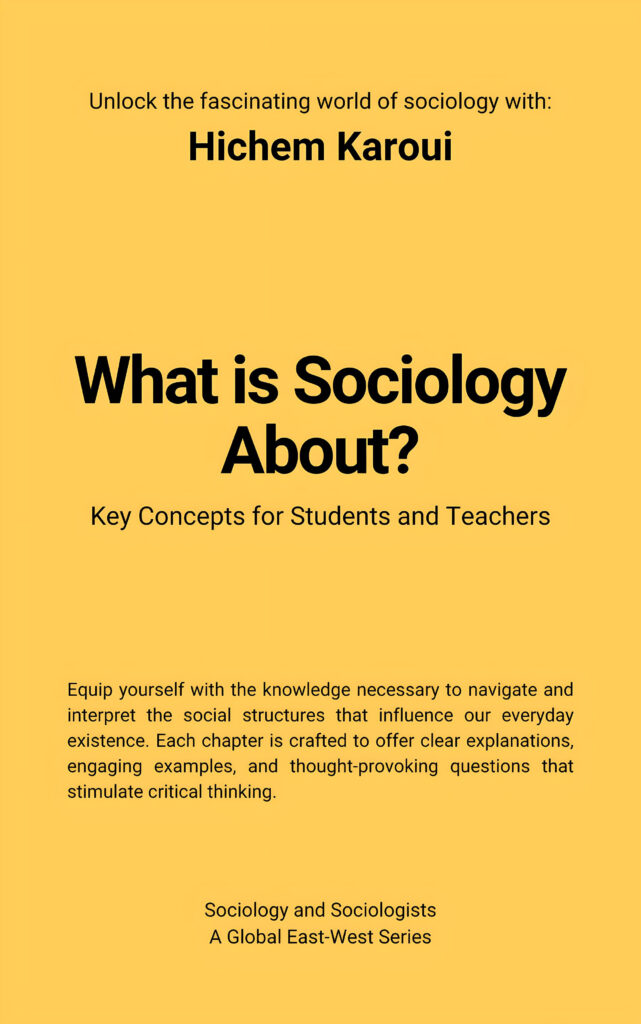Unlocking the Foundations of Society: The Essential Guide to Sociology for Students and Educators
 Understanding the fabric of society is more pressing today than ever, and the release of What Is Sociology About?: Key Concepts for Students and Teachers by renowned sociologist Hichem Karoui provides the perfect entry point. This 172-page volume, part of the Sociology and Sociologists series, is an essential resource designed for both students and educators. It offers a comprehensive overview of sociology’s core concepts, theories, and methodologies, making it a must-read for anyone looking to engage with contemporary social issues.
Understanding the fabric of society is more pressing today than ever, and the release of What Is Sociology About?: Key Concepts for Students and Teachers by renowned sociologist Hichem Karoui provides the perfect entry point. This 172-page volume, part of the Sociology and Sociologists series, is an essential resource designed for both students and educators. It offers a comprehensive overview of sociology’s core concepts, theories, and methodologies, making it a must-read for anyone looking to engage with contemporary social issues.
The Evolution of Sociology: A Historical Perspective
In What Is Sociology About?, Karoui meticulously traces sociology’s evolution from its inception to the present day. By examining the discipline’s historical context, readers gain a deeper appreciation of the significant theoretical perspectives that have shaped sociology. This historical analysis not only contextualizes current sociological theories but also highlights the dynamic nature of the field.
Exploring Key Concepts in Sociology
Karoui’s book delves into critical sociological topics essential for understanding modern society’s complexities. Key themes explored include:
- Social Structures and Institutions: Understanding how different social structures, such as family, education, and government, influence individual and group behavior.
- Inequality: Addressing issues of social stratification, privilege, and the impact of economic disparities on communities.
- Culture: Analyzing cultural norms, values, and beliefs and how they shape social interactions and identities.
- Religion: Investigating the role of religion in society, including its influence on social cohesion and conflict.
- Deviance and Social Change: Exploring why individuals engage in deviant behavior and how societies respond to change.
These topics are interwoven to demonstrate how they interact and shape the social world, offering valuable insights to readers.
Methodologies in Sociological Research
An essential feature of Karoui’s work is its emphasis on the methodologies employed in sociological research. The book explores various research methods, including quantitative surveys and qualitative studies, and highlights the ethical considerations involved in conducting sociological research. Notably, Karoui dedicates a section to participant observation, illustrating its importance in understanding complex social behaviors.
Practical Structure for Enhanced Learning
What Is Sociology About? is organized to facilitate effective learning. Each chapter includes key takeaways, reflective questions, and suggested readings, ensuring that both novice learners and seasoned educators can make the most of the material. This thoughtful structuring not only aids comprehension but also encourages critical engagement with the subject matter.
The Relevance of Sociology in Today’s World
Karoui’s work underscores sociology’s multifaceted nature, reinforcing its relevance in addressing today’s pressing social issues. As contemporary society grapples with challenges ranging from systemic inequality to cultural clashes, understanding the principles of sociology becomes crucial. The book encourages readers to think critically about societal dynamics and provides the tools necessary for meaningful analysis and discussion.
Fostering Critical Thinking and Academic Discourse
What Is Sociology About? is more than just a textbook; it is a strategic contribution to sociological literature that fosters critical thinking. By engaging with key concepts and methodologies, readers are equipped to enhance academic discourse, challenge assumptions, and explore new ideas. This book not only serves as a foundational text but also inspires a deeper engagement with the societal issues that shape our lives.
Conclusion: An Indispensable Tool for Sociological Insight
In a world increasingly defined by social complexities, What Is Sociology About? emerges as an indispensable tool for both students and educators. Hichem Karoui’s expertise and insightful examination of sociological principles make this book a vital resource for anyone interested in understanding the intricacies of society. As academia continues to evolve, this volume stands ready to enlighten and inform future generations of sociologists.
About Global East-West
Global East-West is committed to publishing high-quality academic resources that promote interdisciplinary dialogue and enrich educational experiences across various fields. By prioritizing scholarly contributions like What Is Sociology About?, this organization champions the importance of understanding and addressing the social issues that affect us all.
In essence, What Is Sociology About? is not just an invitation to explore sociology but a comprehensive guide to engaging with the evolving dynamics of our social world.
EXTRACTS
Chapter IV: Research Methods in Sociology
In sociology, research methodologies stand as foundational pillars that underpin the investigation and comprehension of the multifaceted social phenomena that shape human existence (Babbie, 2021). These methods are meticulously crafted to collect and analyze data systematically, aiming to yield profound insights and expand our knowledge of the social sphere. This chapter endeavors to elucidate the diverse research techniques employed in sociology, accentuating their respective advantages, limitations, and ethical implications.
1. Quantitative Research
Quantitative research in sociology entails aggregating and analyzing numerical data to uncover social patterns, relationships, and trends (Creswell, 2014). This approach utilizes statistical techniques to measure and scrutinize data gathered through surveys, questionnaires, or preexisting datasets. By incorporating extensive sample sizes, quantitative research aspires to deliver generalized conclusions that hold relevance for larger populations.
Strengths:
-
Furnishes precise numerical data conducive to statistical analysis, facilitating exact measurements and comparisons (Bryman, 2016).
-
Empowers researchers to test hypotheses and delineate cause-and-effect relationships (Field, 2013).
-
Tends to be more objective than qualitative methods, thereby mitigating researcher bias (Robson & McCartan, 2016).
Limitations:
-
Quantitative techniques may oversimplify complex social phenomena, sidelining the subjective experiences and meanings associated with them (Hammersley, 2013).
-
Restricted in capturing the nuances of social interactions and the contextual elements influencing human behavior (Denzin & Lincoln, 2011).
-
An over-reliance on numerical data may obscure significant qualitative dimensions of social life (Tashakkori & Teddlie, 2010).
2. Qualitative Research
Qualitative research investigates the subjective experiences, significances, and interpretations that individuals associate with social phenomena (Patton, 2015). This methodology encompasses in-depth interviews, participant observation, and comprehensive analyses of documents or texts. Through qualitative research, sociologists gain intricate insights into social interactions, cultural practices, and the complexities inherent in human behavior (Silverman, 2016).
Strengths:
-
Provides rich, nuanced descriptions and explanations of social phenomena (Mason, 2018).
-
Facilitates the exploration of underlying meanings, social processes, and personal experiences (Charmaz, 2014).
-
Allows for examining dynamic and context-sensitive social phenomena (Flick, 2018).
Limitations:
-
Findings may lack generalizability owing to smaller sample sizes and the highly contextual nature of qualitative research (Wengraf, 2001).
-
Susceptibility to researcher bias during data collection and analysis (Cohen, Manion, & Morrison, 2017).
-
Time-consuming and resource-intensive, often limiting the viability of large-scale studies (Creswell & Poth, 2017).
Qualitative research encompasses several pivotal methodologies:
-
a) In-depth interviews: Researchers conduct open-ended discussions with individuals or small groups to elicit rich qualitative data, exploring participants’ perspectives, experiences, and interpretations of social phenomena (Kvale & Brinkmann, 2015).
-
b) Participant observation: Researchers immerse themselves in the social environments they examine, actively observing and engaging in social activities. This method provides a more nuanced comprehension of social behaviors and interactions (DeWalt & DeWalt, 2010).
-
c) Content analysis: Researchers systematically analyze written, visual, or auditory materials to discern themes, patterns, and meanings. By scrutinizing texts such as literature, news articles, or social media content, they can glean insights into cultural norms, social discourses, and ideological influences (Neuendorf, 2017).
3. Mixed Methods
Mixed methods research synergistically merges elements of both quantitative and qualitative approaches, aspiring to deliver a comprehensive analysis of social issues (Tashakkori & Teddlie, 2010). This technique generally involves an initial phase of quantitative data collection and analysis, subsequently followed by the integration of qualitative methods to enrich the understanding of the topic.
Strengths:
-
Facilitates a holistic exploration of intricate social phenomena by incorporating both numerical and qualitative data (Johnson & Onwuegbuzie, 2004).
-
It strengthens the credibility and validity of findings by triangulating and convergent diverse data sources (Patton, 2015).
-
Affords an opportunity to approach research questions from multiple perspectives (Creswell, 2014).
Limitations:
-
Engaging in mixed-methods research can be labor-intensive and resource-heavy (Rocco, Bliss, Gallagher, & Perez-Prado, 2003).
-
Requires proficiency in both quantitative and qualitative research methodologies (Fetters, Curry, & Creswell, 2013).
-
The intricate integration of data poses challenges, necessitating potential trade-offs between depth and breadth of analysis (Guetterman, Fetters, & Creswell, 2015).
4. Experimental Research
Experimental research systematically manipulates variables to elucidate cause-and-effect relationships within social phenomena (Campbell & Stanley, 1966). This methodology establishes controlled settings replicating real-world situations to test specific hypotheses. While this approach provides robust internal validity in establishing causation, generalizing findings to broader populations in naturalistic settings can be challenging (Shadish, Cook, & Campbell, 2002).
Strengths:
-
Creates a controlled environment for researchers to manipulate variables and establish causal links (Cook & Campbell, 1979).
-
Ensures high internal validity by minimizing confounding variables (Maxfield & Babbie, 2009).
-
Permits the replication of experiments to verify the robustness of findings (Salkind, 2010).
Limitations:
-
Artificial constructs may not fully encapsulate the complexities of real-world situations (McCoy, 2012).
-
Ethical dilemmas may arise from deliberately manipulating or controlling variables (Zimbardo, 2007).
-
Extrapolating findings to real-life contexts is challenging due to the contrived nature of experimental environments (Yin, 2018).
5. Comparative Research
Comparative research aims to scrutinize and juxtapose social phenomena across various societies, cultures, or groups (Wimmer & Gallo, 2013). This approach enables sociologists to investigate the effects of distinct social, political, and economic factors on human behavior and social institutions. It provides insights into both the commonalities and divergences among societies, illuminating universal patterns and particularities.
Strengths:
-
Enables the identification of similarities and differences across distinct societies, cultures, or historical periods (Simmons, 2015).
-
Enhances understanding of how social phenomena are shaped by unique sociocultural contexts (Mahoney & Thelen, 2015).
-
Facilitates the recognition of global patterns and processes (Ragin & Amato, 1994).
Limitations:
-
May neglect the specific historical, political, and cultural nuances that characterize individual societies (King, Keohane, & Verba, 1994).
-
Ensuring comparability between varied societies or cultures can be challenging due to differing contexts and operational definitions (Przeworski & Teune, 1970).
-
Heavily reliant on existing data sources, which can introduce bias and constrain the scope of research (Beck, 2005).
Ethical Considerations
Adherence to ethical standards is paramount in conducting sociological research. Researchers must secure informed consent from participants, ensuring that they comprehend the research objectives, methodology, potential risks, and benefits (Beauchamp & Childress, 2013). Safeguarding confidentiality and privacy is essential, along with ensuring anonymity whenever feasible (American Sociological Association, 2017). Additionally, researchers are obliged to minimize harm, promote the well-being of participants, and respect their autonomy as informed individuals (Liamputtong, 2007).
Conclusion
Research methodologies in sociology are pivotal to enhancing our comprehension of the social landscape. Sociologists can unveil invaluable insights into social behaviors, structures, and transformations using quantitative, qualitative, mixed methods, experimental, and comparative approaches. Adhering to ethical principles serves as a guiding framework to protect participants and uphold the integrity of research findings. Through rigorous and principled research methods, sociology fosters a more informed and equitable society by elucidating the complexities of human social existence (Giddens, 2013).
Summary
We have detailed various sociological research methodologies, including quantitative, qualitative, mixed methods, experimental, and comparative approaches, outlining their strengths, limitations, and ethical considerations.
Key Takeaways
-
Sociology utilizes diverse research methods to understand social phenomena.
-
Quantitative research uses numerical data for statistical analysis, offering precision but potentially oversimplifying complexities.
-
Qualitative research explores subjective experiences and meanings, providing rich insights but potentially lacking generalizability.
-
Mixed methods combine quantitative and qualitative approaches for comprehensive analysis.
-
Experimental research manipulates variables to establish causality in controlled settings, but generalizability can be limited.
-
Comparative research analyzes social phenomena across different societies, revealing similarities and differences.
-
Ethical considerations, including informed consent and minimizing harm, are crucial in all sociological research.
QUESTIONS FOR FURTHER THOUGHT
-
Define quantitative research in sociology and provide two strengths and two limitations of this approach.
-
What are the three main qualitative research methodologies described in the text, and briefly explain each one?
-
What is mixed methods research, and what are its key strengths and limitations?
-
Explain the principles of experimental research in sociology, including its strengths and limitations.
-
Describe the goals of comparative research and identify two strengths and two limitations of this approach.
-
According to the text, what are the ethical considerations that sociologists must address when conducting research?
-
Compare and contrast quantitative and qualitative research methods in terms of their focus, data collection techniques, and types of insights they provide.
-
Why is it important for sociological research to adhere to ethical standards?
-
Based on the text, what are the overall goals of sociological research, and how do different methodologies contribute to achieving these goals?
-
Choose one research method discussed (e.g., quantitative, qualitative, mixed methods, experimental, comparative) and explain a potential research question that could be effectively addressed using that method, justifying your choice.
References For Further Reading
-
American Sociological Association. (2017). Code of Ethics.
-
Babbie, E. (2021). The Basics of Social Research. Cengage Learning.
-
Beauchamp, T. L., & Childress, J. F. (2013). Principles of Biomedical Ethics. Oxford University Press.
-
Beck, U. (2005). Power in the Global Age. Polity Press.
-
Bryman, A. (2016). Social Research Methods. Oxford University Press.
-
Campbell, D. T., & Stanley, J. C. (1966). Experimental and Quasi-Experimental Designs for Research. Houghton Mifflin.
-
Charmaz, K. (2014). Constructing Grounded Theory. SAGE Publications.
-
Cohen, L., Manion, L., & Morrison, K. (2017). Research Methods in Education. Routledge.
-
Cook, T. D., & Campbell, D. T. (1979). Quasi-Experimentation: Design & Analysis Issues for Field Settings. Houghton Mifflin.
-
Creswell, J. W. (2014). Research Design: Qualitative, Quantitative, and Mixed Methods Approaches. SAGE Publications.
-
Creswell, J. W., & Poth, C. N. (2017). Qualitative Inquiry and Research Design: Choosing Among Five Approaches. SAGE Publications.
-
DeWalt, K. M., & DeWalt, B. R. (2010). Participant Observation: A Guide for Researchers. Rowman & Littlefield.
-
Denzin, N. K., & Lincoln, Y. S. (2011). The SAGE Handbook of Qualitative Research. SAGE Publications.
-
Fetters, M. D., Curry, L. A., & Creswell, J. W. (2013). Achieving Integration in Mixed Methods Designs—Principles and Practices. Health Services Research, 48(6), 2134-2156.
-
Field, A. (2013). Discovering Statistics Using IBM SPSS Statistics. SAGE Publications.
-
Flick, U. (2018). An Introduction to Qualitative Research. SAGE Publications.
-
Giddens, A. (2013). Sociology. Polity Press.
-
Guetterman, T. C., Fetters, M. D., & Creswell, J. W. (2015). Integrating Qualitative and Quantitative Methods in Social Research. SAGE Research Methods.
-
Hammersley, M. (2013). What Is Qualitative Research? Continuum.
-
Johnson, R. B., & Onwuegbuzie, A. J. (2004). Mixed Methods Research: A Research Paradigm Whose Time Has Come. Educational Researcher, 33(7), 14-26.
-
King, G., Keohane, R. O., & Verba, S. (1994). Designing Social Inquiry: Scientific Inference in Qualitative Research. Princeton University Press.
-
Kvale, S., & Brinkmann, S. (2015). InterViews: Learning the Craft of Qualitative Research Interviewing. SAGE Publications.
-
Liamputtong, P. (2007). Researching the Vulnerable: A Guide to Sensitive Research Methods. SAGE Publications.
-
Mahoney, J., & Thelen, K. (2015). Advances in Comparative-Historical Analysis. Cambridge University Press.
-
Mason, J. (2018). Qualitative Researching. SAGE Publications.
-
Maxfield, M. G., & Babbie, E. (2009). Research Methods for Criminal Justice and Criminology. Wadsworth Cengage Learning.
-
Neuendorf, K. A. (2017). The Content Analysis Guidebook. SAGE Publications.
-
Patton, M. Q. (2015). Qualitative Research & Evaluation Methods. SAGE Publications.
-
Przeworski, A., & Teune, H. (1970). Quantitative Methodology in Comparative Politics. Random House.
-
Ragin, C. C., & Amato, F. (1994). Constructing Social Research: The Unity and Diversity of Method. Pine Forge Press.
-
Robson, C., & McCartan, K. (2016). Real World Research. Wiley.
-
Rocco, T. S., Bliss, L., Gallagher, D. J., & Perez-Prado, A. (2003). Taking the Next Step: Mixed Methods Research in Organizational Systems. Information Technology, Learning, and Performance Journal, 21(1), 19-26.
-
Shadish, W. R., Cook, T. D., & Campbell, D. T. (2002). Experimental and Quasi-Experimental Designs for Generalized Causal Inference. Houghton Mifflin.
-
Silverman, D. (2016). Doing Qualitative Research. SAGE Publications.
-
Simmons, A. (2015). Comparative Social Research: Theoretical and Methodological Issues. Emerald Group Publishing.
-
Salkind, N. J. (2010). Encyclopedia of Research Design. SAGE Publications.
-
Tashakkori, A., & Teddlie, C. (2010). Mixed Methodology: Combining Qualitative and Quantitative Approaches. SAGE Publications.
-
Wengraf, T. (2001). Qualitative Research Interviewing: Biographic Narrative and Semi-Structured Methods. SAGE Publications.
-
Wimmer, A., & Gallo, J. (2013). A Guide to Comparative Research. Social Forces, 91(3), 775-802.
-
Yin, R. K. (2018). Case Study Research and Applications: Design and Methods. SAGE Publications.
-
Zimbardo, P. G. (2007). The Lucifer Effect: Understanding How Good People Turn Evil. Random House.

